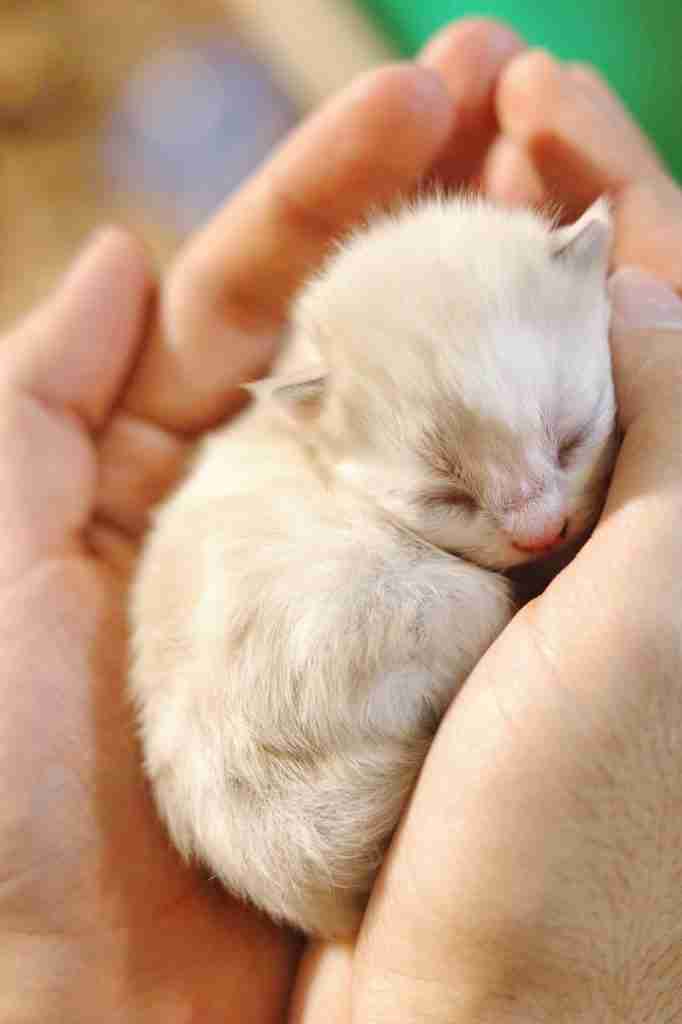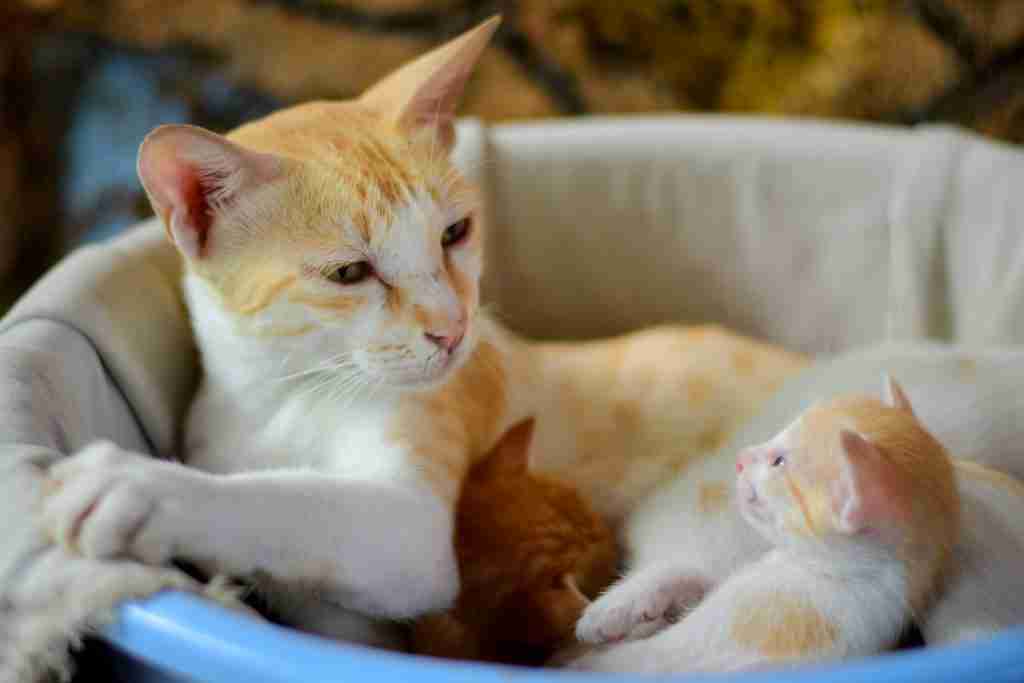In the first few weeks of life, a mother cat is likely to move her kittens around a lot. For your safety, this is the most vital reason to do so. Kittens are particularly vulnerable to predators in the wild. Their mother can only cover them because they are unable to open their eyes. But why do cats bring you their kittens?

Why Do Cats Bring You Their Kittens?
Your cat brings you her kittens over and over again so that they can become used to you and learn your standards of behavior. Your cat wants her kittens to get acquainted with humans because she knows she will be living with you and her litter.
You Might Like: When Do Cats Balls Drop?
What Are They Thinking When Cat Bring You Their Newborn Kittens?
1. Ensure The Safety Of Her Kittens
Keeping this in mind, we can deduce that the fundamental motivation for cats to bring their young to humans is to protect them.
To continue with our story about Isabella, we used to live in a forested location that offered a lot of places for her to hide her kittens but also had a lot of animals that might eat them.
She eventually concluded that her family provided the safest and healthiest environment for her babies. After all, she hadn’t noticed any dangerous animals in the area around us, had she?
When your cat gives you one of her kittens, she is, in effect, greeting you as a fellow human. Would it be okay if I dropped these little balls of fur off with you?
It would appear that you are quite capable of ensuring that there are no monsters in the area.
They have no sense of sight, never stop squeaking, and require food every three hours. “I hope you succeed!”
Okay, it’s not an exact example, but that’s pretty much what she’s thinking, and we’re confident that the primary reason your mother cat is bringing you her kittens is that she fears for their safety if they are not with you.
2. I Need Your Assistance!
Aside from the possibility of danger, your cat’s mother may simply need a rest, and she is relying on you to provide it for her. It is not unheard of for multiple cats to take turns looking after a litter of younger kittens.
In the realm of animal sheltering, we were always given foster kittens who had been abandoned by their parents. When these kittens were found, however, they should have all been abandoned because it was quite likely that their mother was already out looking for food and had no intention of coming back for them.
Even so, we would search for a mother who was already breastfeeding so that she might be paired with these orphaned kittens and give them a chance at life. In most cases, the mother cat’s maternal instincts would kick in, and she would start taking care of the orphaned kittens.
There are also several documented cases of domestic cats entrusting the care of their young to another female cat.
Where does it all lead, and why bother?
It is not common for a cat to ask its owner for help in bearing any of the responsibilities. However, she is only bringing her kittens to you because she needs a break or even some assistance with caring for them.
3. A Place For The Family
One more possibility is that your cat thinks of your house as her home and of you as a member of her family because she views both of these things as being important to her.
Therefore, it is only natural that she will bring her litter to you. After all, this is also her house, and she must get her family back together as soon as possible!
Even though cats are notoriously hostile and independent creatures, their demeanor can completely transform when placed in a domestic environment with adequate access to food and water.
You Might Like: When Do Cats Stop Being Playful?
What’s With All The Meowing And The Kittens That My Cat Keeps Bringing Me?

You are a member of her pack/pride, and she has full confidence in you.
She recognizes how well you care for her and how well you will care for her children.
Leaving the kittens with you while she takes a break from caring for 3-6 or more kittens could be a valid explanation.
You are the baby’s surrogate mother regardless of whether or not the mother can carry the child to term.
It is you she is counting on to safeguard the survival of the infants if she is unable to do so.
Maybe the place where she gave birth isn’t the ideal fit for her, and she’d like you to assist her to locate a better fit for her and the newborns.
She may be unable to perform anything on her own, depending on her age, and will look to you for assistance. After all, you’re the one she has complete confidence in.
Because of her inexperience as a mother to kittens, she isn’t sure what to do or how to act. Some animals have no maternal instincts at all, despite the remoteness of the possibility.
As a result, we humans step in and hand-raise the kittens because she does not want to be around them.
You Might Like: Why Do Cats Paw At The Window?
What Drives a Mother Cat to Protect Her Kittens from Their Father?
Paternal cats’ instincts differ from those of mothers in several ways. There’s a good chance the father of the kittens may want to engage in some playful interaction with them. His actions could potentially harm them. Due to a lack of maternal instinct, male cats may inflict harm.
However, this does not mean that male cats are naturally violent towards their young. All male cats exhibit the same maternal behavior as their female counterparts.
They provide a haven for kittens to seek warmth and nourishment. Kittens can be in danger if their mothers lack basic maternal instincts.
According to Biology of Reproduction, female cats do not ovulate for six weeks after birth. This is a possible reason why your cat is avoiding male cats.
She wouldn’t want to mate with anyone else again. If a male attempts to harm her at this time, she will undoubtedly respond violently.
You Might Like: Why Do Dogs Attack Cats?
What Should You Do If a Cat Moves Her Kittens Around?
Allow a new mother cat some privacy and respect. The house’s regulations should be loosened up.
Strange behavior in your cat could be due to a variety of causes. Her hormones must be rebalanced for her to feel her best.
Almost sure, your cat would make a refuge someplace in the house. Do not interfere with what she is doing and treat it as her own space.
Don’t try to swap your kittens or your pet for another one. If you don’t, she’ll grow irate and aggressive.
If at all possible, stay away from this location for four weeks. Reduce the number of people and the noise they create.
No vacuuming or other loud noises are permitted. If you have children, tell them not to come.
Your cat will locate you if she wants you right now. Now and then, she’ll come out to the litter box to receive some attention.
The same rules that apply to your dog apply to your cat. Don’t let the fact that she’s had a baby get in the way.
As you play with your cat, have a look at her breasts. These should be visible and swollen on her stomach. In addition, the nipples will be damp.
They are in good health, and this means that they are getting enough food and exercise. Maybe she likes to lick her kitten’s neck!
You Might Like: Why Do Siamese Cats Meow So Much?
Final Thought
At the end of the day, your cat is simply trying to do what’s best for her kittens. By bringing them to you, she is hoping that you will be able to help care for them. Whether it’s because she needs a break or because she views you as part of her family, there are several reasons why your cat might bring her kittens to you. If you’re ever in doubt, just remember that your cat is only trying to do what’s best for her kittens.

